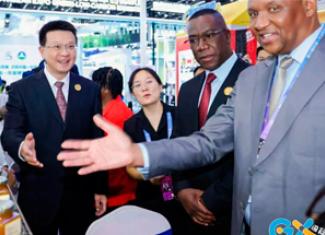KwaZulu-Natal’s investment agenda
ready to take-off

The KwaZulu-Natal Investment Conference 2025, which was recently at the Inkosi Albert Luthuli International Convention Centre in Durban, has confirmed the province’s status as a leading investment destination in South Africa.
Building on the success of the 2024 edition, which secured pledges worth R85.2 billion this year’s event surpassed expectations, targeting R95 billion in new investment commitments and drawing significant interest from both local and international investors.
The conference was officially launched earlier this year by KwaZulu-Natal’s MEC for Economic Development, Tourism and Environmental Affairs, Reverend Musa Zondi, as part of a concerted effort to attract sustainable and inclusive economic growth to the province.
Creating value chains
Speaking during the launch, Trade & Investment KwaZulu-Natal (TIKZN) Chief Executive Officer Sihle Ngcamu outlined a clear vision for the event. He said the focus would be on attracting a diverse range of capital projects, particularly those requiring between R100 million and
R300 million, to allow the province to drive industrial development through well-established value chains. Ngcamu, who was permanently appointed as CEO of TIKZN in September 2024, following a year in an acting capacity, played a key role in steering the event’s strategic direction. Under his leadership, the conference took a pragmatic approach to aligning public and private sector investment, with particular focus on infrastructure readiness.
“We brought key infrastructure players on board – including Transnet, Eskom, SANRAL, and various water boards – whose projects will underpin the successful rollout of new investments. These public infrastructure commitments are essential in catalysing private sector interest and ensuring long-term viability of the projects,” he added.
New projects
Ngcamu is of the view that investment must also speak directly to people’s lives, particularly in rural areas, adding that there were projects that were already packaged and are ready for investors. Two of these are in the Zululand District.
“One involves the creation of an industrial park around the airport of Ulundi so we can revitalise the node. The second project will deal with the issue around eco-tourism and leverage on the rich heritage of the region, especially Emakhosini Valley, he explained”
Other flagship projects include the Drakensberg cable car in the Uthukela District, an airport relocation plan in King Cetshwayo to expand Richards Bay’s aviation capacity and a feasibility study nearing completion for a clothing and textile special economic zone in Umzinyathi.
“Those developments must go where they are really needed [in order] to grow the outer lying districts so that we do not congest cities like Durban and Pietermaritzburg, he added”.
But Ngcamu is clear-eyed about the current global environment. “We have in recent times seen a decline in terms of global inflows... While our traditional markets are still critical for us, we think that it is time that we start opening up to more markets”.
International engagements
To that end, TIKZN has been active internationally. “Two months ago, the entity attended the FOCAC (Forum on China–Africa Cooperation) engagements. Three months ago its leadership was in Japan and China again in September, a team was in Algeria for an export market exhibition. We are in the markets that we feel will be supportive of KwaZulu-Natal as the export hub of the country, with the two major ports that we have, we feel we are positioned as a gateway. While the difficult times are here, we feel there are great opportunities that we can still leverage.”
The agency’s strategy is clear: “We are positioning KwaZulu-Natal as an export-led location where foreign investments will come to establish and export to the rest of the continent.
Addressing geopolitical tensions
Ngcamu said the conference also focused on the impact of global geopolitical tensions on investor confidence. He noted that the conference actively addressed these concerns by engaging key industry and policy stakeholders to reaffirm South Africa’s position as a viable and attractive investment destination.
This is expected to “pave the way forward” and instil renewed confidence in the country’s trade and investment landscape, despite broader global uncertainty.
Ngcamu also emphasised the importance of ensuring that small businesses benefit meaningfully from the investment drive. The conference featured Small, Medium, and Micro Enterprises (SMMEs) from across KwaZulu-Natal, offering them a platform to showcase their products and services to potential partners and investors.
He also explained that a dedicated “deal room” was created specifically to foster commercial linkages between large corporations and emerging enterprises. The intention, he said, was to create real opportunities for collaboration between established companies and small businesses or start-ups, supporting a more inclusive and integrated provincial economy.
Cutting red tape
Perhaps most importantly for investors, Ngcamu emphasised that KwaZulu-Natal is taking decisive steps to cut through bureaucratic red tape – one of the most common barriers to investment. He made it clear that regulatory delays would not be allowed to derail progress.
“If we do not have systems in place to manage regulatory approvals efficiently, we will face bottlenecks that clog the system of government,” he explained. To address this, TIKZN, under the guidance of the MEC for Economic Development, Tourism and Environmental Affairs, established a dedicated Project Brokering Unit. This mechanism is designed to streamline approvals by bringing all relevant stakeholders into one coordinated, project-specific forum.
“It is not just a general meeting,” Ngcamu said. “We take one project, identify the necessary regulatory approvals and the authorities involved, and then build a committee around that project. All the key role-players sit around the table to map out a way forward”.
Projects that receive investment pledges are elevated to catalytic status, a designation that ensures oversight and support from the KwaZulu-Natal Cabinet, adding weight and urgency to their implementation.
Ngcamu reaffirmed that KwaZulu-Natal is open for business and ready to deliver. His leadership, strategy,and unwavering message point to one mission: positioning the province as Africa’s premier investment gateway, anchored in inclusive and sustainable growth.




